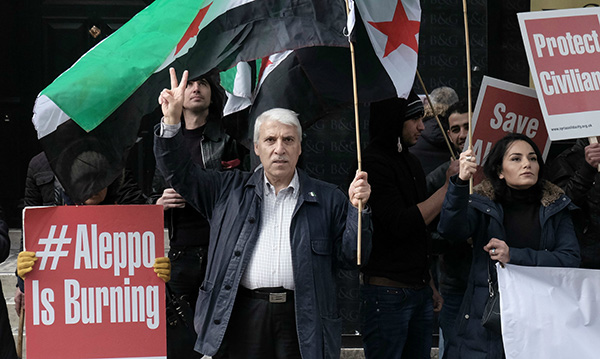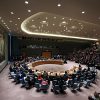
The fall of Aleppo in the hands of the government forces of Bashar al-Assad, with the military support of Russia and Iran, is producing both winners and losers; on both sides this new state of affairs will have repercussions over the short, medium and long terms that go far beyond the local tragedy it has caused.
Losers
The civilian population of the city: in a war that has already lasted five years, looks set to continue and has claimed more than 400,000 lives, the Eastern part of what was once the economic capital of Syria lies in ruins. And the main losers are the residents, the people who have had to endure bombardments, massacres and other atrocities and for whom, after a patchy and agonisingly delayed evacuation, further retaliation may lie in store.
International law and human rights: the United Nations, in the form of its Secretary General Ban Ki-moon, has described what has happened in the city as a “total meltdown of humanity”. Neither laws governing the conduct of war nor international law in general have been respected. The famous Responsibility to Protect, quoted in some Security Council resolutions in reference to other conflicts, has been widely flouted. Right up to the end there was no plan for protecting civilians. Some observers have compared Aleppo to Srebrenica in the Yugoslav Wars, and Grozny, the Chechen capital. It provides a bad omen for the unrelentingly bloody attempt to retake Mosul from the hands of Daesh (Islamic State), currently underway in Iraq.
The rebels: these are an amalgam of moderates opposed to the regime and various Salafist and Jihadist groups. They still control a significant chunk of territory. But while the West encouraged part of the population (the majority) to rebel in the ‘Syrian Spring’ five years ago, it later dropped them upon realising it did not know exactly what it was supporting, and gave priority to the fight against Daesh. The fall of Aleppo is an extremely hard blow that the opponents of the dictatorial regime will find hard to recover from. Other than in Tunisia, the ‘Arab Springs’ have ended in utter failure. The idea of democracy and human rights in the region, and in the wider world, has also of course suffered a setback.
The West and the EU: what has befallen Aleppo reveals the weakness of the US and European influence in the region. The US has proved incapable of devising and following a strategy. And if the recent joint call to action from Angela Merkel and François Hollande amid the unfolding humanitarian disaster reveals anything it is their impotence and that of the EU, which has been capable only of talk and no action, verbally condemning while passively regarding events, as became clear at the European Council last week. And Europeans bear some of the responsibility, because it was their colonial policies that drew the absurd boundaries still governing the Middle East. The EU has split, and its internal policy has foundered with the waves of refugees from Syria. Although, if the time for reconstruction comes, it will be the EU that picks up a considerable part of the bill.
The International Community: the failure of the UN and its Security Council, owing above all to the internal stand-off with Russia, has rendered this concept hollow and consigned Aleppo to its fate.
Saudi Arabia: it had sided with and aided the rebels. The country is economically and politically weakened, which, combined with this defeat, will have an impact on its regional tussle with Iran.
Daesh: although Islamic State was not part of this battle, there will be more international drive to combat it in other parts of Syria and Iraq. We will see a mutation of this variety of Jihadist terrorism if it continues losing the territorial base needed for its self-proclaimed caliphate.
The concept of Syria: the long-term survival of the al-Assad regime cannot be founded on the concept of Syria it has tried to impose on Aleppo. The tragedy, and the hatred and mistrust it has sown, will make the construction of a viable state even more unworkable.
Winners
The al-Assad regime: over the short to medium term, however, the regime and its President have been strengthened compared to their prospects just a year and a half ago. But it relies on the military support of Russia and Iran, without whose help it would not have been able to retake Aleppo, or other cities it has attacked. The regime once again controls the country’s main cities, and has become indispensable in the international fight against Daesh. It is worth remembering that during his campaign the US President-elect, Donald Trump, expressed a willingness to cooperate with the regime and the Russians in the war against Daesh.
Iran: the country now has Shiite allies in a geographically continuous swathe from Teheran to Beirut, including a large portion of Iraq. It has penetrated the Arab world, and with its nuclear deal it has ended its international isolation, something Trump alone will be unable to derail. It has the support in this war of Lebanon’s Hezbollah. And it has become a key player in the fight against Daesh in Iraq and Syria.
Russia: the Russians have strengthened their presence in Syria in support of the regime, and in the war against Daesh. Russia’s military intervention is fulfilling its goals and reinstating it as a decisive player in the region. Although officially it stopped bombing the rebels in Aleppo in September, its aircraft carrier remains in the area and it is not saying whether, after announcing their withdrawal, it still has troops on the ground. Its intervention in Syria, where Russia has its only military bases outside the former Soviet Union, has enabled it to end its international isolation. Turkey, Iran and Russia are set to hold talks on Syria in Moscow on 27 December.
Turkey: the country has moved closer to Russia and Iran. It is maintaining a difficult and shifting balance, and its main target throughout the conflict has not been Daesh so much as preventing the Kurds from strengthening themselves to the extent of being able to claim their own state in the region. Turkey’s agreement with the Europeans is essential to halt the wave of refugees that has destabilised European politics.
Israel: on the sidelines of this tragedy, Israel has increased its freedom to shun negotiations with the Palestinians, and would prefer Syria not to collapse.
All this is creating a rebalancing of forces and actors in the region; it will lead to profound changes in a part of the world already wracked by a long cycle of upheavals, starting with the 1979 Khomeini revolution in Iran, Western support for the Mujahideen and al-Qaeda in their struggle against the Soviet Union after the invasion of Afghanistan that same year, the occupation and defeat of the state apparatus in Iraq by the US in 2003 and the frustrated Arab Springs. Aleppo, despite its role in preserving a regime in power, is a sign that great change is underway.


